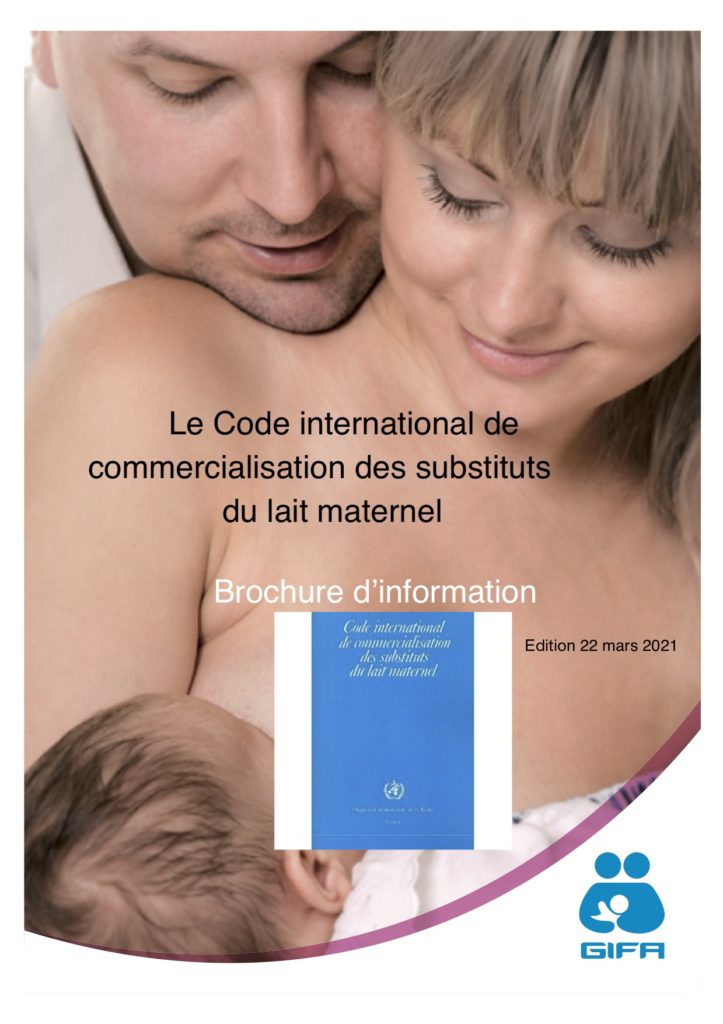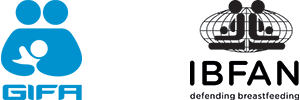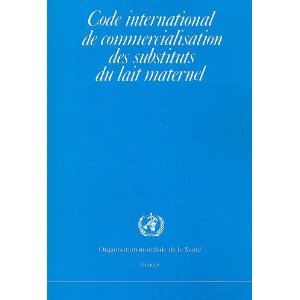2022/14/10
The International Code of Marketing of Breastmilk Substitutes was adopted in 1981 by the World Health Assembly (WHA), of which Switzerland is a member. Its aims to protect breastfeeding and infant and young child nutrition.
Purpose of the Code
- Protecting breastfeeding and infant and young child feeding (IYCF) from commercial influences.
- Protecting families from pressure and abusive marketing
- Ensure factual labeling and proper use of infant formula.
Information Flyer on the Code
Cette brochure a été révisée à l’occasion de la célébration des 40 ans du Code international.GIFA Brochure sur le Code international-22mars2021Download

The International Code
After the publication of the Code in 1981, the WHA has adopted resolutions on infant and young child feeding (IYCF) every 2 years to reinforce and clarify the text of the Code ratified in 1981. By International Code is meant: the 1981 text as well as all subsequent relevant WHA resolutions (20 resolutions in total by 2020).
Swiss Voluntary Codex
In 1982 Switzerland adopted some provisions of the Code in a voluntary agreement; this agreement was revised in 1994, 2010, 2013 and more recently, in 2017. It is entitled Manufacturers’ Code of Conduct for the Marketing of Infant Formula and is currently under review. This voluntary Codex is reinforced by national legislation:
Swiss Federal Law
- Article 41 “Limitation of the Advertising of Infant Formula” of the Ordinance on Foodstuffs and Common Objects (ODAlOUs), (in French)
- Articles 17 and 18 of the DFI Special Food Ordinance (OAS). (in French)
See also:
- Protection, promotion and breastfeeding support – 3 key pharmacist roles – IBFAN-GIFA 2013 (French) and
- Breastfeeding: exceptional personalised medicine – IBFAN-GIFA 2016) (French)
Loopholes in Swiss Legislation
The measures adopted by Switzerland do not cover the International Code in its entirety and violations of the International Code are therefore very numerous in Switzerland.
- The Swiss Legislation does not apply to bottles and teats,
- It only covers formulae for infants under 6 months of age;
- Follow-on milk and all other infant formulae do not fall within the scope of the Swiss Code.
- OAS art. 9 even opens the way to advertising cereals from 4 months of age, a non-vital food and not comparable to Formulae for Infants.
- Switzerland does not control the commercial financing of congresses and trainings, resulting in conflicts of interest between health and marketing.
Why the reluctance in Switzerland?
Switzerland, in fashion with many European countries, justifies its limited application of the Code by using the arguments of the industry sector, which stipulate that the International Code in its entirety is only valid for developing countries. The Swiss Codex Panel (French page) is in charge of the monitoring of the Swiss Codex.
Conflicts of Interest
Although manufacturers are required to monitor their own implementation of the Code, the monitoring of the Code at the national level should be independent (Art. 11.2 of the International Code); however, manufacturers are members of the Codex Panel, thus creating a situation of conflicts of interest inasmuch as they are judge and jury.
The Convention on the Rights of the Child
The Convention was concluded in 1989 and Switzerland ratified it in 1997. Article 24 of the Convention (in French) on the Rights of the Child to the enjoyment of the highest attainable standard of health refers to the importance of breastfeeding.
General Comment 15 on Article 24 on the right of the child to the highest attainable standard of health of the Convention on the Rights of the Child, written in 2013, clearly states that, for optimal infant and young child feeding, state obligations correspond to those defined in the Global Strategy for Infant and Young Child Feeding (IYCF), adopted in 2002 by the WHA: “implementing and monitoring existing measures to give effect to the International Code of Marketing of Breast-milk Substitutes and to subsequent relevant Health Assembly resolutions, and, where appropriate, strengthening them or adopting new measures.”
Further information
Art. 41 Limitation of advertising for infant formula (ODAIOU, Swiss Federal Legislation)
1) The marketing of infant formula must be limited to specialised publications in the field of childcare and scientific publications and contain only scientific and factual information. This information cannot suggest or support the idea that bottle use is equal to or greater than breastfeeding.
(2) There shall be no point-of-sale advertising, sample distribution or any other direct-to-consumer promotional practices at the retail level, such as special stands, coupons, bonuses, special sales, sales at a loss and tie-ins for infant formulae.
(3) Manufacturers and distributors of infant formula shall not provide the general public or pregnant women, mothers or members of their families with free or low-cost products, samples or any other promotional gifts, either directly or indirectly through health services.
Article 17 para. 1 of the Special Food Ordinance (OAS, Swiss Federal Legislation) states that:
“Infant formula is food intended for the particular nutritional needs of infants (children under 12 months of age) in good health during the first four to six months of life, and which fully meets the nutritional needs of this category of people.”
Indeed, despite this article, the current Manufacturers’ Code of Conduct (2017) adds that: “Follow-up foods under Article 18 OAS, which are recommended and used as part of a mixed feeding of healthy infants over six months of age and which receive diversified foods, are not considered to be infant formulae. “There is therefore still confusion between the (vague) law and the Code of Conduct for Manufacturers.

